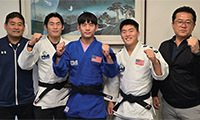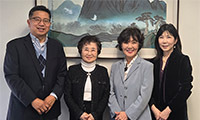▶ By Lee Sun-ho
Due to the many Korea-related sights and sounds reminding us of our tragic past, I felt the short stay was very homelike. At first glance most official and commercial signboards are written both in Chinese and Korean. Korean is spoken everywhere, even by third-or fourth-generation ethnic Koreans, often called “Chosonjok.” A daily newspaper called “Yanbian Ribao” is published in Korean. Chinese TV stations broadcast KBS, MBC, and SBS programs. The Korean won is circulated freely, without the need to exchange it into Chinese yuan. A majority of tourists visiting Yanbian Prefecture are from Korea. Even ethnic customs like folk dance, music, swings and food are common to the 854,000 Koreans in Yanbian, representing more than half of the total ethnic Korean population in China.
Korean compatriots in Yanbian are not necessarily well-off compared to the other 44 minorities in the province of 26 million people. They show a strong interest in seeking lucrative job opportunities in South Korea. They depend largely on agriculture, using nightsoil that is of the same as in Korea. Besides the main crop, rice, they grow corn, eggplants, “frog melons,” peanuts, potatoes, sunflowers, pumpkins and tomatoes in the fields and gardens. They also breed livestock like hogs, goats, oxen, sheep, etc. Quite a number of them are engaged in small-and medium-sized businesses including restaurants, shops and trading offices. Gen. Cho Nam-ki is recognized as one of the most successful figures in public life among ethnic Koreans residing in Yanbian.
The former building of Daesung Middle School (now called Longjing Middle School) was turned into a museum displaying items of the school’s illustrious history and achievements made by the distinguished graduates who were active both in South and North Koreas. They include Generals Chung Il-kwon and Lee Joo-il, Painter Chun Kyong-ja, Pastor Moon Ik-hwan and North Korean Deputy Premier Lee Chong-ok. Above all, Poet Yoon Dong-joo is the most respected figure admired by Koreans in Yanbian. A stone monument with one of his poems inscribed on it is erected outside the museum building. One out of five middle school classes is composed of third-or fourth-generation ethnic Koreans.
The past of many Korean independence fighters against Japanese colonial rule can be traced through the Yanbian area. One particular pavilion, “Yisongting” erected by Chinese authorities in 1980, stands on the ridgeline of Mt. Piyanshan. It is the very site overlooking the Hayran River and the Ryongmoon Bridge where under a majestic pine tree patriotic Korean independence fighters would get together to plan and put in motion anti-Japanese activities. Kim Il-sung’s guerrilla activities were said to have originated here.
Longjing City and the Tumen River were areas of Chungshan-ri district in which major victories were won in the battle with Japanese invaders, led by such Korean Independence Army leaders as Generals Lee Bom-suk, Kim Jwa-jin and Hong Bom-do, on the way from Yanji to Mt. Paektu (Changbaishan in Chinese).
Kaishantun in Yanbian and Sambong in North Korea face each other across the Tumen River. I was allowed to go on foot to the mid-point of the 100-meter-long Tumen Bridge. There I could vividly see the North Korean border checkpoint with its flying red star banner and a couple of border guards. All my colleagues and their spouses seemed to be somewhat serious, thinking of the 55-year-old separation from our northern half, at a time when divided family members of the two Koreas were enjoying their bitter but sweet four-day reunion in Seoul and Pyongyang, respectively, engaging in wishful thinking for the eventual reunification of our fatherland.
The most inspiring event was climbing Mt. Paektu, a sacred mountain for both China’s Ching Dynasty (1644-1912) and the two Koreas, and looking into the famous crater lake called “Heavenly Lake (Tianchi in Chinese)” on the afternoon of August 17. Luckily enough, as we were driving along the edge of the crater the ominous thick clouds resting on the famous lake and 16 peaks of the great mountain were gradually moving to the Chinese side near the peak. Everyone was joyful and excited to clearly see the whole scene of the highest mountain peaks and the widely-known lake, and spent their limited time taking pictures of the lake and mountain peaks on the North Korean side as background before the clouds would hide the spectacular scene again.
Among the 16 peaks of Mt. Paektu, the highest one is General (or Paektu) Peak on the North Korean side with an altitude of 2,749 meters, followed by Balyunfong on the Chinese side with 2,691 meters. It was rare and wonderful to have a 9.82 square-kilometer lake on the summit of the 2,189 meters high mountain. The lake’s circumference is 13.1 kilometers. It is 373 meters deep, at points 4.85 kilometers south-north and 3.35 kilometers long east-west. Climbing on foot to Tianchi is permitted through the hill near the 68-meter-high Changbaishan Waterfall during the day only.
Yanbian Daewoo Hotel in Yanji has the most modern and elegant accommodations in the Autonomous Prefecture. Its management performs a consulate general’s role and function to some extent for the 854,000 ethnic Koreans in Yanbian and the rest of Koreans in other former Manchurian provinces. I heard that local Chinese people, including ethnic Koreans, had a preconceived perception of South Korea as a brutal puppet dictatorship run by American imperialists until the year 1987, when a Chinese passenger airplane accidentally landed on South Korean soil, and all the crew members were well treated and returned safely to China. Furthermore, the 1988 Olympiad in Seoul conclusively introduced South Korea to the Chinese as a remarkable country with big potential to be favorably recognized as a promising neighbor.
At Changbaishan Daewoo Hotel, a special freshwater fish named “mountain-stream fish” was served at our party’s dinner table. North Koreans raise four different kinds of such freshwater species in Tianchi, and the fully-grown ones are caught in a stream around the Changbaishan Waterfall in China. Other foods we were served were hare meat, roe deer and badgers as well as vegetables and fruits common in the Yanbian area.
With everything I experienced and witnessed at Yanbian Prefecture, I felt amused and at peace with the improved understanding of geographical and historical curiosity, as most Korean visitors agreed. Setting aside bygone agonies of Korean compatriots with sweat and toil, it is now time for present-day Koreans to enforce our efforts for mutual exchange and greater cooperation in various aspects between people of the two Koreas, north and south, and ethnic Koreans in Jilin and other parts of Northeast China and Russia’s Primorskii Krai (Maritime Province) in the vicinity. They can play an important intermediary role and function, not only on the path toward eventual reunification of the two Koreas but also as a means to be a very useful input in accelerating and furthering forth-coming growth and development in performing special Sino-Korean relations. From now on, we need to develop practical tools and techniques to help find out ways and means of ensuring, analyzing, and applying common interests and practical correlation between Korean compatriots residing in Yanbian and its vicinity, and Korean nationals dwelling in their peninsula, the fatherland.
스마터리빙
more [ 건강]
[ 건강]이제 혈관 건강도 챙기자!
[현대해운]우리 눈에 보이지 않기 때문에 혈관 건강을 챙기는 것은 결코 쉽지 않은데요. 여러분은 혈관 건강을 유지하기 위해 어떤 노력을 하시나요?
 [ 건강]
[ 건강]내 몸이 건강해지는 과일궁합
 [ 라이프]
[ 라이프]벌레야 물럿거라! 천연 해충제 만들기
 [ 건강]
[ 건강]혈압 낮추는데 좋은 식품
[현대해운]혈관 건강은 주로 노화가 진행되면서 지켜야 할 문제라고 인식되어 왔습니다. 최근 생활 패턴과 식생활의 변화로 혈관의 노화 진행이 빨라지고
사람·사람들
more
[화제] 유도 미 국가대표 3형제… “LA 올림픽 금메달 위해 구슬땀”
3형제가 나란히 미국 국가대표로 활약하고 있어 화제다. 조슈아 양(22·-60kg급), 제이콥 양(20·-66kg급), 조나단 양(18·-60…

연세대 남가주 동문회… “61주년 맞아 새로운 도약”
연세대학교 남가주 동문회 제50대 회장으로 취임한 권기숙 회장이 신임 회장단과 함께 본보를 방문해 향후 동문회 운영 방향과 비전을 밝혔다. 1…
LA 북부한인회, 글렌데일 시청서 ‘한인의 날’
LA 북부한인회(회장 박승목)는 미주 한인 이민 123주년 기념 ‘미주 한인의 날’을 맞아 지난 13일 글렌데일 시청에서 열린 한인의 날 선포…
‘전통 실크등의 아름다움’
LA 한국문화원이 경상남도 진주시와 함께 ‘한국의 빛: 진주 실크등 전시회’를 1월15일부터 2월28일까지 개최한다고 밝혔다. 이번 전시는 문…
코윈 퍼시픽 LA 신년회·이사장 취임식
세계한민족여성네트워크(KOWIN) 퍼시픽 LA 지부(회장 조미순)는 지난 7일 LA 용수산에서 신년회 및 이사장 취임식을 개최했다. 참석자들은…
많이 본 기사
- 트럼프, 반발시위 거세지는 미네소타에 “내란법 발동할 수 있어”
- 백악관 “이란서 800건 처형 중단돼…살해 계속시 심각한 결과”
- “트럼프 야욕 안꺾여”…덴마크·유럽 주요국, 그린란드에 파병
- 美남부사령관후보자 “중러의 서반구 병력배치·본토위협 막을것”
- 박나래 ‘전 남친’ 정체, 직접 밝혔… 1
- 2026 밀라노·코르티나담페초 동계올림픽 스키 종목
- 스포티파이, 미국 등서 요금 인상…월 12.99달러
- 美, ‘반정부 시위 탄압’ 이란 당국자 제재…對이란 압박 높여
- 사기 피해 방지하려면… 시도 때도 없이 걸려오는 스팸 전화·문자 ‘심각’
- 10억 vs 3000만 원..박나래·전 매니저, 합의서 공개 ‘입장차 극명’
- ‘워너-넷플릭스 계약정보 즉각 공개’ 파라마운트 청구 기각
- 건강문제 첫 조기귀환…ISS 우주비행사 4명 지구 안착
- 김경·강선우·前보좌관, 전부 진술 엇갈려…3자 진실공방 양상
- 주택가 공놀이에 벌금·징역까지? 1
- 美자산운용사 블랙록, 운용자산 14조 달러 돌파…ETF가 성장주도
- 트럼프, ‘피난처’ 지자체에 “연방 … 1
- ‘40세’ 강은비, 임신 21주만 유산 “조기 양막 파열..子 보냈다”
- 붉은 고기, 얼마나 먹어야 안전할까?… 전문가들 조언은
- 美, 멕시코서 미군 참여 마약단속 원해…셰인바움 정부 압박
- 방탄소년단 월드투어, 외신도 집중.. “새로운 기준 제시할 것”
- 경찰, 김병기 ‘사라진 금고’ 추적…… 1
- 독일, 그린란드에 병력 보내며 “중러… 1
- 트럼프, 브라질·소말리아 등 75개국 이민비자 발급 중단
- 선 넘은 스타벅스 직원 경찰에 ‘돼지… 1
- ‘12살 연하♥’ 신정환, 가석방 3년 만에 결혼.. “혼전임신이었다” 고백
- 라과디아 예술고교 9학년 김나린양 MTNA 주니어 우드윈드 부문 동부 디비전 우승
- 뜨거운 ‘韓日 동맹 라인’ 이토 AS→김민재 골 ‘열도 홀렸다’... 일본 “콤파니 황태자들, 완벽히 해냈다” 찬사
- 이혜훈 “청약 논란, 조사 결과 따를 것”…자녀 의혹엔 답변 피해
- 운전면허증 발급시 유권자 자동등록
- 송성문 어떻게든 MLB 뛰게 한다 “3루·2루·1루에 심지어 외야까지 시도” 감독 확언
- 프랑스 마크롱, 이란·그린란드 사태에 긴급 국방회의
- 국적이탈 수속에 2년이나 걸리다니⋯ 2
- ‘환율·반미정서·고비용’ 미국 관광산업 ‘된서리’
- 무서운 ‘독감’… 한인 5세 아동 사망
- 뉴욕한인회‘제123주년 미주한인의 날’ 기념식 성황
- LA “단속 요원 오지마” ‘ICE … 2
- 오바마케어 가입자 급감…보조확대 종료 탓?
- NYPD, 플러싱 전기스쿠터 날치기 수배
- 모기지 금리 인하와 주택 시장의 변곡… 1
- 75개국 대상 이민비자 ‘전면 중단’
- ‘장동건♥’ 고소영, 노안 고백 “돋… 1
- 한인타운 다울정 인근 ‘보행자 친화 … 1
- [여명] 망국병 ‘진영 논리’ 1
- 올 중간선거 연방의회 ‘대물갈이’ 예고
- 버라이즌 통신망 ‘먹통’ LA 등 한때 서비스 장애
- 워싱턴 인사이트… 올 중간선거 연방의회 ‘대폭 물갈이’ 예고
- 주거 공간만으론 부족… 신체·정신적 건강까지 챙겨야
- 잔나비, ‘학폭’ 유영현 탈퇴 7년만 근황 공개..피해자와 화해했다
- ICE 요원 총격 관련 연방검사들 줄사직
- 이소룡 기념 우표 나온다… 내달 첫 공개 행사
1/5지식톡

-
 한국 안경을 무료 배송으로 받아보실…
0
한국 안경을 무료 배송으로 받아보실…
0안녕하세요. 서울 안암동에 위치한 ‘보고싶다 안경원’입니다.저희는 다년간 한국 고객분들께 착용감 좋은 안경테와 한국안경브랜드,고압축 도수 렌즈를 합리적인 가격에 제공해온 안경 전문점입니다.이번에 해외 배송이 가능해…
-
 미 육군 사관학교 West Poin…
0
미 육군 사관학교 West Poin…
0https://youtu.be/SxD8cEhNV6Q연락처:wpkapca@gmail.comJohn Choi: 714-716-6414West Point 합격증을 받으셨나요?미 육군사관학교 West Point 학부모 모…
-
 ☝️해외에서도 가능한 한국어 선생님…
0
☝️해외에서도 가능한 한국어 선생님…
0이 영상 하나면 충분합니다!♥️상담신청문의♥️☝️ 문의 폭주로 '선착순 상담'만 진행합니다.☎️ : 02-6213-9094✨카카오톡ID : @GOODEDU77 (@골뱅이 꼭 붙여주셔야합니다…
-
 테슬라 자동차 시트커버 장착
0
테슬라 자동차 시트커버 장착
0테슬라 시트커버, 사놓고 아직 못 씌우셨죠?장착이 생각보다 쉽지 않습니다.20년 경력 전문가에게 맡기세요 — 깔끔하고 딱 맞게 장착해드립니다!장착비용:앞좌석: $40뒷좌석: $60앞·뒷좌석 …
-
 식당용 부탄가스
0
식당용 부탄가스
0식당용 부탄가스 홀세일 합니다 로스앤젤레스 다운타운 픽업 가능 안녕 하세요?강아지 & 고양이 모든 애완동물 / 반려동물 식품 & 모든 애완동물/반려동물 관련 제품들 전문적으로 홀세일/취급하는 회사 입니다 100% …
케이타운 1번가
오피니언
 한 영 재미수필가협회 회장
한 영 재미수필가협회 회장 [한영의 독서칼럼] 햇살을 향해 헤엄치기
 이규민 한식진흥원 이사장
이규민 한식진흥원 이사장 [로터리] 시간을 담그는 문화, 한국의 장
 이상훈 서울경제 정치부장
이상훈 서울경제 정치부장 [여명] 망국병 ‘진영 논리’
 허경옥 수필가
허경옥 수필가 [윌셔에서] 숲의 숨으로
 이영태 / 한국일보 논설위원
이영태 / 한국일보 논설위원 [지평선] 조롱받는 72만 ‘쉬었음 청년’

[왈가 왈부] 김경·강선우 뒷북 출금… ‘수사 뭉개기’ 의심 살 만하네요
 정숙희 논설위원
정숙희 논설위원새로 나온 이상한 식품 피라미드
 데이빗 이그나티우스 워싱턴포스트 칼럼니스트
데이빗 이그나티우스 워싱턴포스트 칼럼니스트 [데이빗 이그나티우스 칼럼] 그린란드에 대한 트럼프의 위험한 집착
 김동찬 시민참여센터 대표
김동찬 시민참여센터 대표 [미국은 지금] 침팬지의 그루밍과 인간의 민주주의
1/3지사별 뉴스

뉴욕한인회‘제123주년 미주한인의 날’ 기념식 성황
뉴욕한인회(회장 이명석)가 13일 맨하탄 뉴욕한인회관에서 개최한‘제123주년 미주한인의 날’ 기념 행사가 각계에서 활동 중인 1.5세 및 2세…
국적이탈 수속에 2년이나 걸리다니⋯

연방의회서 “한인 위상·한미동맹 제고” 한목소리
한인 이민자들이 미국에 도착한 123주년을 기념하고 한인들의 미국 사회에의 기여를 알리는 ‘제 21회 미주 한인의 날’ 행사가 13일 연방의회…
한국학교 방향성 재정립 모색

트럼프 “美시민에 사기친 귀화 이민자, 국적 불문 시민권 박탈”
도널드 트럼프 대통령은 13일 “소말리아든 어디 출신이든, 귀화 이민자 중 우리 시민들을 상대로 사기를 쳐 유죄 판결을 받으면 시민권을 박탈할…
SF 기독대학교 ‘성장 발전’ 기대

오늘 하루 이 창 열지 않음 닫기 


















































.png)


댓글 안에 당신의 성숙함도 담아 주세요.
'오늘의 한마디'는 기사에 대하여 자신의 생각을 말하고 남의 생각을 들으며 서로 다양한 의견을 나누는 공간입니다. 그러나 간혹 불건전한 내용을 올리시는 분들이 계셔서 건전한 인터넷문화 정착을 위해 아래와 같은 운영원칙을 적용합니다.
자체 모니터링을 통해 아래에 해당하는 내용이 포함된 댓글이 발견되면 예고없이 삭제 조치를 하겠습니다.
불건전한 댓글을 올리거나, 이름에 비속어 및 상대방의 불쾌감을 주는 단어를 사용, 유명인 또는 특정 일반인을 사칭하는 경우 이용에 대한 차단 제재를 받을 수 있습니다. 차단될 경우, 일주일간 댓글을 달수 없게 됩니다.
명예훼손, 개인정보 유출, 욕설 등 법률에 위반되는 댓글은 관계 법령에 의거 민형사상 처벌을 받을 수 있으니 이용에 주의를 부탁드립니다.
Close
x